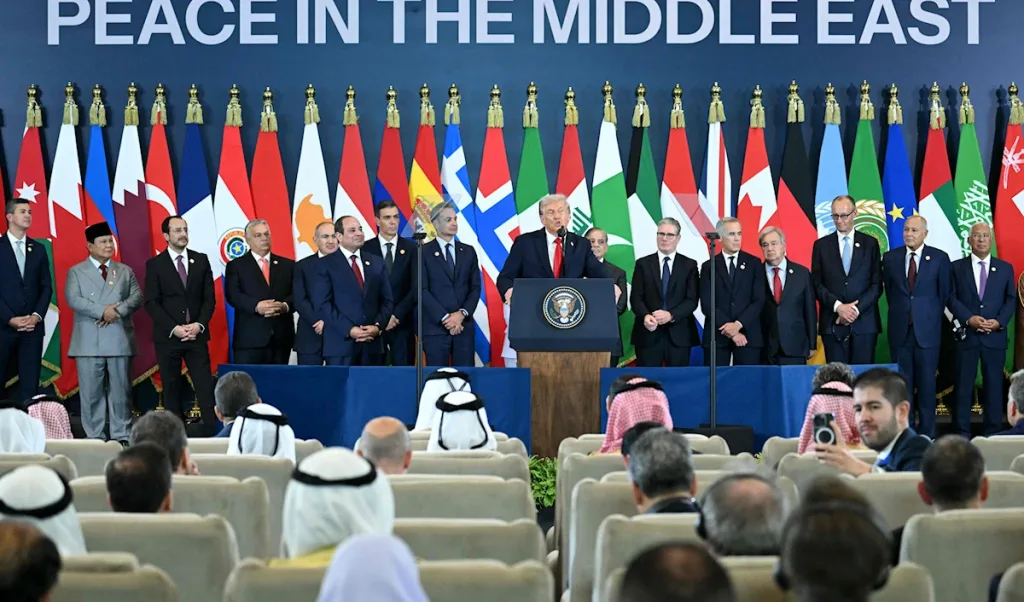
Donald Trump at the “Peace 2025” summit in Sharm al-Sheikh. Photo: APN.

Orinoco Tribune – News and opinion pieces about Venezuela and beyond
From Venezuela and made by Venezuelan Chavistas

Donald Trump at the “Peace 2025” summit in Sharm al-Sheikh. Photo: APN.
By Palestine Desk – Oct 14, 2025
Donald Trump’s recent appearances in occupied Jerusalem and at the “Peace 2025” summit in Sharm al-Sheikh left little doubt about how he envisions the post-Gaza war Middle East. Speaking before the Israeli Knesset, he declared that the Arab and Islamic states supporting his ceasefire plan could not have done so without what he called “the weakening of Iran and the destruction of Hezbollah and Hamas through US and Israeli power.” In other words, their compliance depended on US and Israeli domination. He openly credited them for pressuring Hamas to release Israeli captives, the role he assigned them from the start.
Surrounded by his full administration, which he proudly listed by name, Trump presented the war as a joint US-Israeli victory. Any “disagreements” he admitted having with Benjamin Netanyahu were reduced to details within that partnership. His trip to Sharm el-Sheikh, in turn, was not about peace but about binding the attending Arab states to the next phase of his plan: disarming the resistance forces that Israel failed to defeat in the battle, while dressing this submission as diplomacy. In exchange, he offered guarantees of halting Israeli aggression to spare Washington’s Arab allies further embarrassment.
Unlike the celebration in Israel, the mood in Sharm el-Sheikh was heavy. Trump addressed the summit’s 31 Arab, Islamic, and international participants in the voice of a conqueror, congratulating his Israeli “partners in victory” in one venue and consoling his Arab “allies” in another, as if they were born to defeat, in front of European witnesses whom he regarded as scarcely better. His message was blunt: their collective mission now is to “clean” the battlefield and reconstruct Gaza “safely”; that is, in a way that ensures Israel’s security and continues integrating the entity into the region through the expansion of the “Abraham Accords.” The poorer states were there merely to fill the quorum and sign, symbolically, the document of surrender, represented by Turkey, Egypt, and Qatar as mediators alongside the United States.
Trump’s late arrival at the summit prevented some leaders from speaking, leaving the hall restless. Discussions centered on the roles of each state: France expressed readiness to assume a greater role alongside Britain, including the possible deployment of forces within an international mission. Germany preferred to offer logistical and financial support, while Italy signaled openness to all options to back the ceasefire process. Egypt and Qatar reaffirmed their role as guarantors that the resistance would refrain from carrying out any operations against the occupation entity, while warning of potential Israeli violations. Addressing the annexation issue of the West Bank, Cairo suggested expanding the role of the Palestinian Authority, under new figures capable of “managing” the situation as part of the ceasefire framework.
Trump’s phone call from the summit hall to Saudi Crown Prince Mohammad Bin Salman reflected Washington’s interest in securing Gulf funding for Gaza’s reconstruction (particularly Saudi Arabia and the UAE) and Saudi-Israeli normalization, paving the way for more Arab states to follow. An Egyptian official later told Al-Akhbar that communication channels with Riyadh and Abu Dhabi would soon resume to ensure their involvement in additional measures supporting the ceasefire following tensions that had led to the absence of both MBS and UAE President Mohammed bin Zayed.” The official added that “Egyptian President Abdel Fattah al-Sisi might embark on a Gulf tour to hold direct meetings unless a breakthrough occurs swiftly.”
On the sidelines, Sisi’s meeting with Emmanuel Macron focused on Gaza and Lebanon, while Macron and Mahmoud Abbas discussed training Palestinian cadres in Egypt and Jordan to manage Gaza’s security under an international force, mainly from Islamic countries but structured and funded by the US and Europe.
Reports that Netanyahu had been invited to the summit via a phone call between Trump and Sisi caused a minor storm. His excuse of “Jewish holidays” was treated by Cairo as a relief, sparing the conference an embarrassing scene. An Egyptian official later told Al-Akhbar that Cairo’s unexpected invitation aimed to seize the chance for a closed meeting between Netanyahu, Abbas, and Trump, which Netanyahu avoided to escape any discussion of a two-state solution, fearing domestic backlash. Although the summit’s closing statement reaffirmed, “a Palestinian state with East Jerusalem as its capital on the June 4, 1967 borders,” that issue was absent from substantive discussions, which focused on reconstructing Gaza, securing Israel, and assigning the Arab world the task of cleaning up after it.